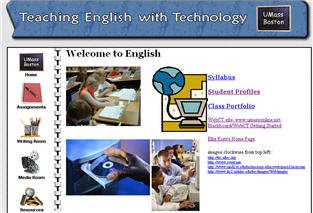This week's reading really took me by surprise. I had definitely thought about how the internet could affect reading, most importantly focusing on how a student would process the information they received online. I thought about both the layout or presentation of the information and the quality of the information. I also considered how hypertext could affect a student's ability to process the information at hand or even feel overwhelmed by too much information. I liked that Kajder provided concrete examples in Chapter 4 of her book about how to best use hypertext in the teaching of writing using technology. Julia’s hypertext project about New York was a great example of how this assignment might actually play itself out in a classroom. I can see how an activity like this would motivate students to use literature and writing. I also appreciated her section on “Reading Skills” because initially the idea of presenting such a task in a lower level reading class seemed impossible to me. I don’t think it could be done without the use of graphic organizers and such because of the non-linear aspect of hypertext.
Yet, after reading K&V's article, my conception of the internet as providing non-linear text has changed. At least from a Western perspective, there is a linear format to the presentation of material, both visual and textual online. Like other forms of literacy, they gave me the impression that there can also be rules online to provide readers with an easier way to process the information they read. Their article also made me think about how the internet is perceived, read, interpreted in other parts of the world. Their article presented the idea of a global language, yet even though the information is perceived differently the internet is one of the closest things to a global language that we have. The information although not interpreted the same can be translated for most viewers to read. This gives us access to others worlds, other forms of thinking, other forms of presenting information. I like the idea that this article presented about the idea of global language and how this relates directly to literacy and literature, both accessible to other cultures and ethnicities. It makes me think of the soul that the internet actually does have, in contradiciton to " what Sven Birkets (1994) refers to as a ‘battle between technology and the soul” (34). Kajder mentions that “Birkherts (1994) cautions that hypertext works to eradicate what we know as literature and literacy, arguing that ‘the premise behind textual interchange is that the author possesses wisdom, an insight, a way of looking at experience that the reader wants…. This is the point of writing and reading’” (34). I think that lookinng at the internet as a global portal almost, a capsule to allow us to travel and explore other forms of literacy, then the idea of the reader still bringing their own background and experiences to the text and the images that they interpret still hasnt' changed. Even the reader's choice about what hypertext to choose will differ depending on the who the reader is and how they encounter the information at hand.
Course homepage

Course homepage
Subscribe to:
Post Comments (Atom)
No comments:
Post a Comment